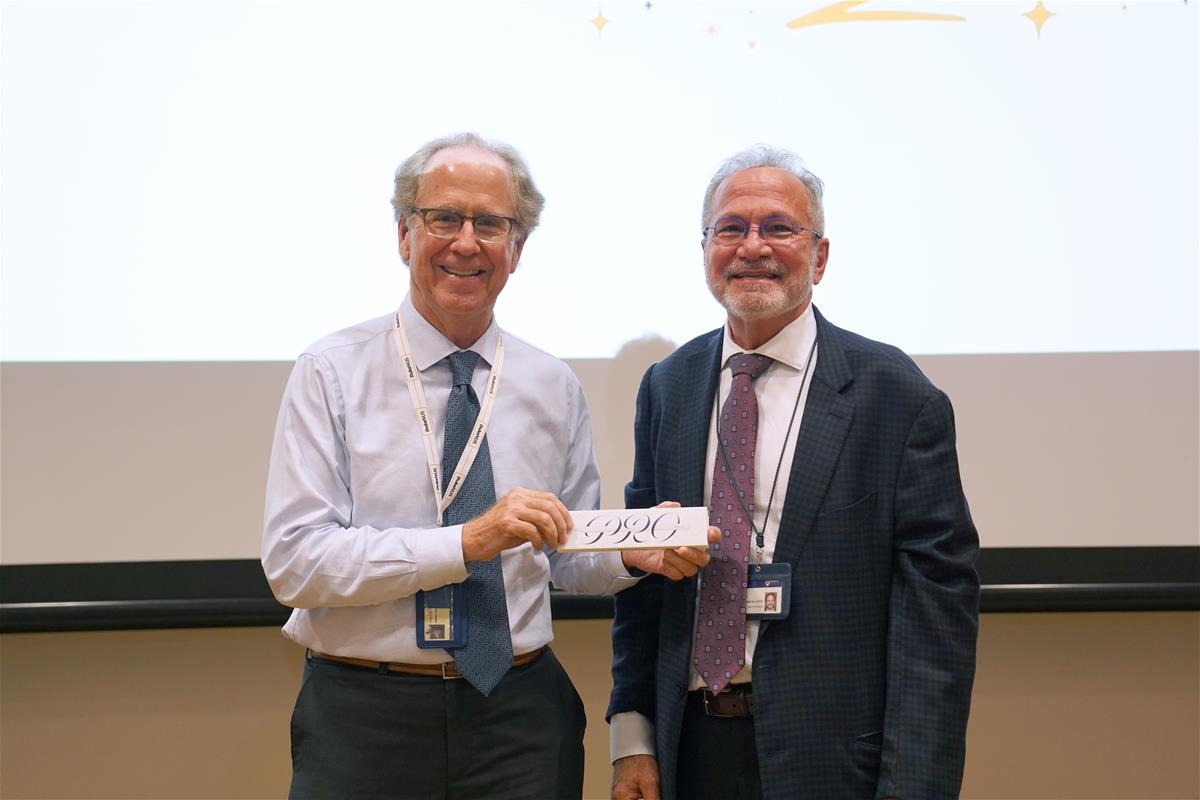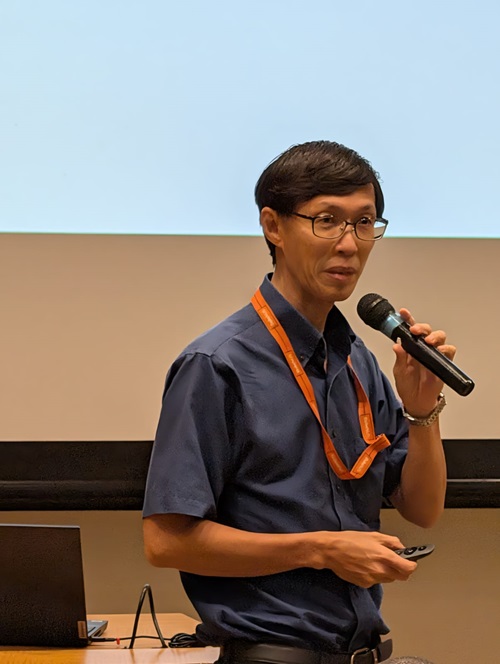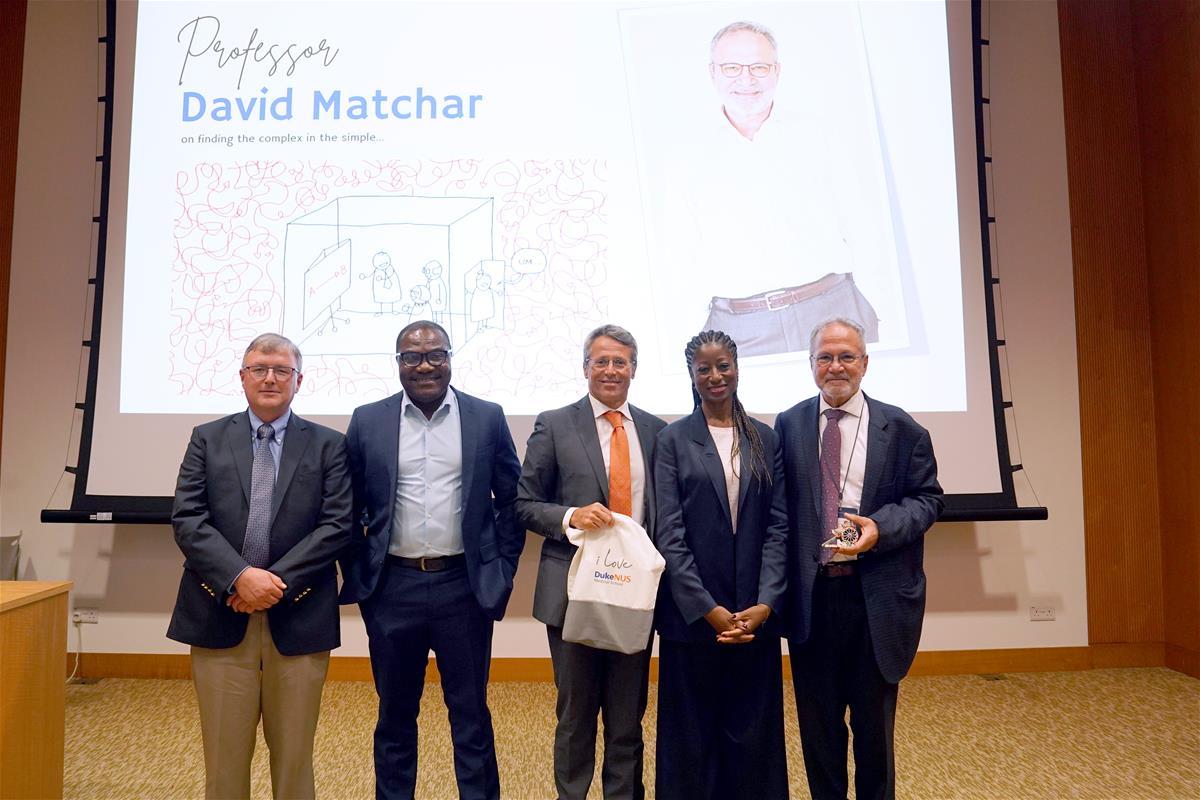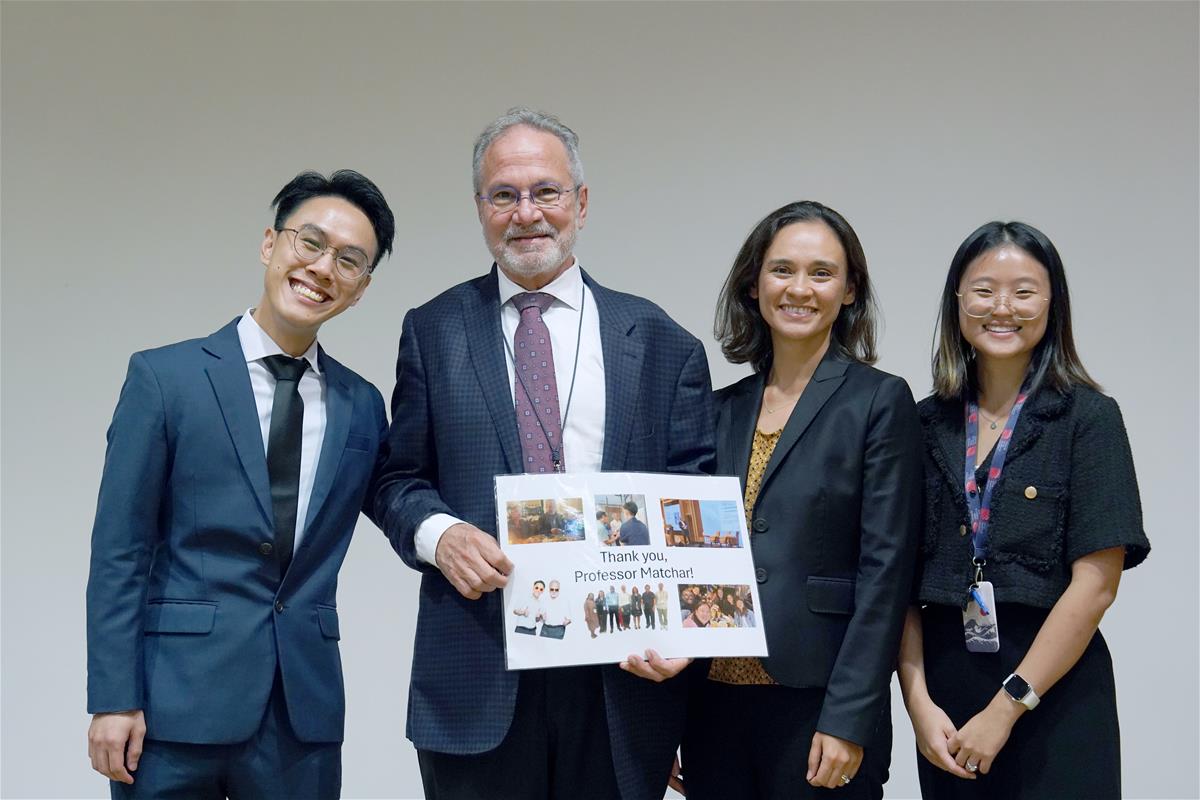Professor David Matchar is no stranger to many at Duke-NUS and beyond—particularly in the field of health services and systems research, which he not only advanced but also helped embed in the School, as the founding director of the Health Services and Systems Research (HSSR) Programme.
On 10 September, more than 50 guests from Duke-NUS and around the world gathered at the School’s Amphitheatre for a special symposium honouring his contributions over the past 17 years. The event focused on a research interest close to his heart: system dynamics, a modelling method he has used to distil complex healthcare issues into policies that improve medical care.

Dean Prof Thomas Coffman (left) presents Prof David Matchar (right) with a token of appreciation
Building a legacy in health systems research
 Prof Coffman delivers his opening remarks // Credit: Daryl Li
Prof Coffman delivers his opening remarks // Credit: Daryl LiOpening the symposium, Dean Professor Thomas Coffman, paid tribute to Prof Matchar, or “David M” as he is affectionately known at the School.
“His many scientific accomplishments have cemented his status as an international authority in health services research,” said Prof Coffman. “But he has also contributed significantly as a leader and as a mentor, overseeing the training of many graduate students and post-docs, and guiding the career development of junior faculty members at both Duke and Duke-NUS.”
Prof Coffman added: “Fittingly, each of these parties will be represented as parts of his legacy through the symposium today.”
And indeed, following his remarks, former colleagues, collaborators and mentees took to the stage, testifying to the comprehensive and profound impact of Prof Matchar’s work at Duke-NUS and beyond.
Former Vice-Dean for Research, Professor Pat Casey elaborated on Prof Matchar’s pivotal leadership in building the research programme, including the recruitment of key faculty and the establishment of two major academic research centres at Duke-NUS: the Lien Centre for Palliative Care and the Centre for Ageing Research and Education.
Prof Casey commented: “We had a wonderful time, and he was a terrific director, and when the time came for a transition, he left the Programme in terrific shape.”

Prof Pat Casey reflects on his time working with Prof Matchar

Prof Marcus Ong thanks Prof Matchar for his contributions to the Programme // Credit: Daryl Li
Professor Marcus Ong, who succeeded Prof Matchar as director of the Programme, thanked him for his efforts, noting: “What started as an idea and a dream is now a reality and is thriving… a growing programme that is going from strength to strength.”
Leading through collaboration and connection
Each of the speakers at the symposium spoke of Prof Matchar’s sizeable impact on the field of system dynamics. Dr Aku Kwamie described his role in establishing a Systems Thinking expert group at the Alliance for Policy and Systems Research at the World Health Organisation.
For Professor Peter Hovmand, from the School of Medicine at Case Western Reserve University, it was Prof Matchar’s ability to lead large teams that stood out. He reflected on the many symposia organised by Prof Matchar over the years and how they have influenced his research.
“David has a unique talent for bringing people together,” he added.
Echoing Prof Hovmand’s sentiments, Associate Professor Enzo Bivona from the University of Palermo added: “His leadership is based not only on authority per se, but the ability to genuinely listen to everyone.”

Prof Matchar shares a photo with the speakers (from left to right): Prof Peter Hovmand, Asst Prof John Pastor Ansah, Assoc Prof Enzo Bivona and Dr Aku Kwamie
A mentor who puts students at the heart
Former colleague, Assistant Professor John Pastor Ansah from Case Western Reserve University—who had worked with Prof Matchar for 11 years, focusing on systems modelling to support Singapore’s healthcare transformation through Healthier SG—also thanked him for being a wonderful mentor.
And because no celebration of Prof Matchar’s career would be complete without his students—a testament to his mentorship, the audience also heard from his PhD students: Dr Vanessa Koh and Dr Marya Getchell.
In their presentations, Dr Koh and Dr Getchell spoke about their research work under Prof Matchar’s supervision—specifically on implementing falls prevention in Singapore and evaluating genetic testing technology for detecting tuberculosis respectively.
Dr Koh described Prof Matchar as “an absolutely amazing mentor who always puts his students first”.

The proud mentor with his students: Postdoctoral researcher and emcee for the day, Dr Lai Wei Xuan (first from left); Dr Marya Getchell (second from right) and Dr Vanessa Koh (first from right)
A mission that carries on
And while the evening was meant to celebrate him, in true David M fashion, Prof Matchar also made his thank-you speech about systems thinking.
He remarked: “Together, let us build a future where systems thinking doesn’t just reshape how we see healthcare, but profoundly changes how care is delivered, so that every decision is wiser, every pathway clearer and every patient is better served.”
Reflecting on his four-decade career, he added, “I’m not retiring from this mission. My home remains in Singapore, and I look forward to mentoring, collaborating—and maybe just sharing a coffee, or a casual loop diagram.”
With his nomination as Emeritus Professor, Prof Matchar’s journey in health systems research is set to continue—reminding us of the power of finding simplicity in complexity.
Unless otherwise stated, all photos in this story are copyrighted to Duke-NUS Medical School.